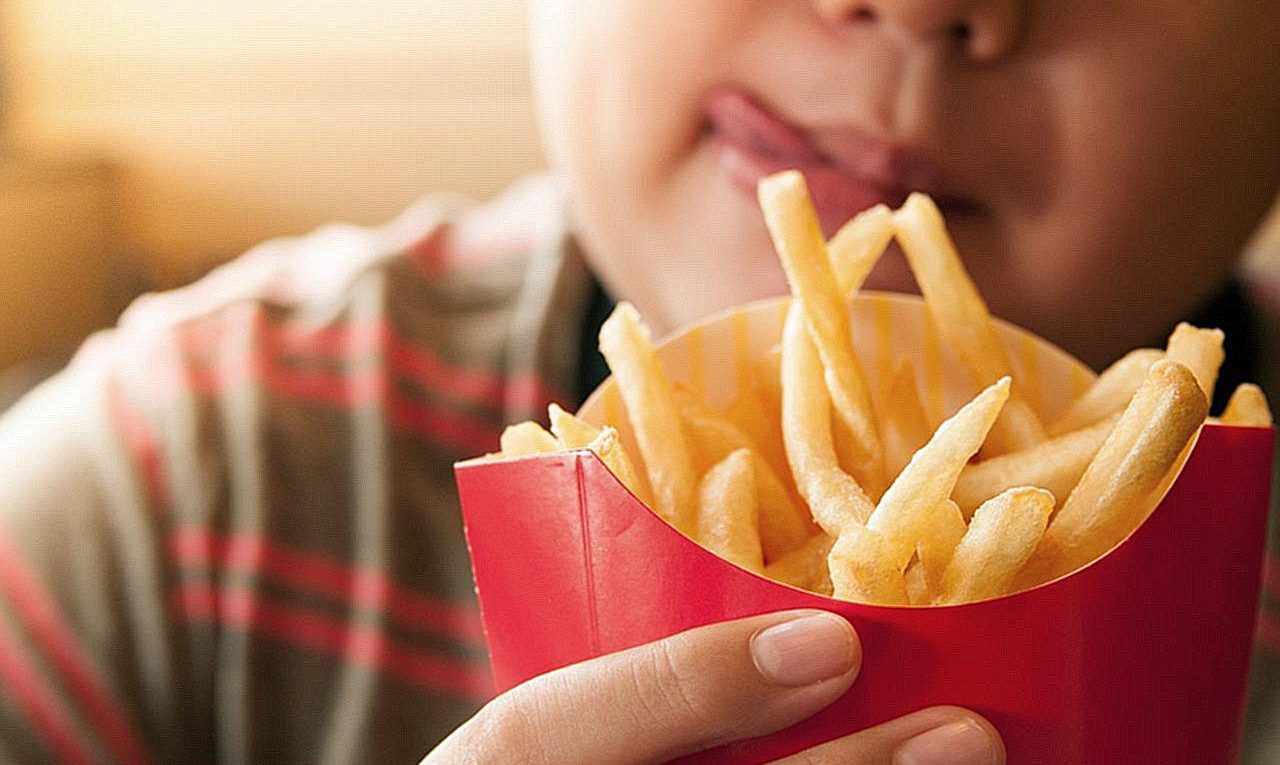Can Frenchies eat Mcdonald’s fries?
Welcome to our blog post, where we embark on a tasty adventure to answer a question that’s got pet parents and fast-food fans scratching their heads – Can Frenchies (aka French Bulldogs) chow down on those iconic McDonald’s fries?
So, grab a drink, kick back, and prepare to be amazed by the surprising truth about Frenchies and those irresistible golden fries.
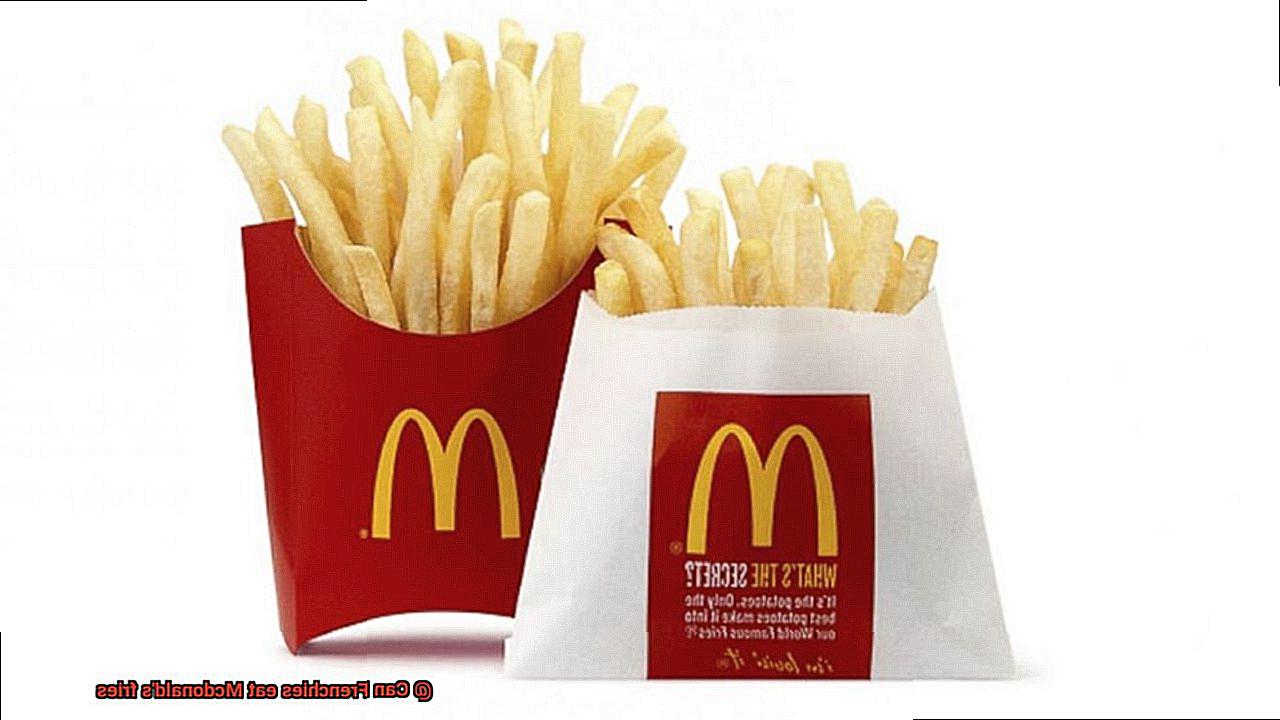
Understanding the Potential Risks of Feeding Frenchies McDonald’s Fries
Contents
- 1 Understanding the Potential Risks of Feeding Frenchies McDonald’s Fries
- 2 Why Are McDonald’s Fries Unhealthy for French Bulldogs?
- 3 The Health Risks of Eating Too Much Fast-Food Fries
- 4 What Are Some Healthy Alternatives to McDonald’s Fries?
- 5 Tips for Introducing New Foods to Your Frenchie’s Diet
- 6 How to Determine If Your Dog Is Allergic to Fast-Food Fries
- 7 What Happens If My Frenchie Eats McDonald’s Fries?
- 8 Making Sure Your Dog Gets the Proper Nutrition from Their Food
- 9 Conclusion
When it comes to McDonald’s fries, it’s important to understand the potential risks involved. In this article, we’ll explore why feeding Frenchies these tasty treats may not be the best idea and provide healthier alternatives for occasional indulgence.
Understanding the Potential Risks:
Weight Gain and Obesity:
French Bulldogs are prone to weight gain and obesity, which can worsen existing health issues or increase the risk of developing new ones. McDonald’s fries are high in fat, and regular consumption can lead to unwanted weight gain in your Frenchie.
Excessive Salt Intake:
The high salt content in McDonald’s fries can cause dehydration, electrolyte imbalances, and kidney problems in French Bulldogs. These issues can be particularly problematic for dogs with pre-existing health conditions.
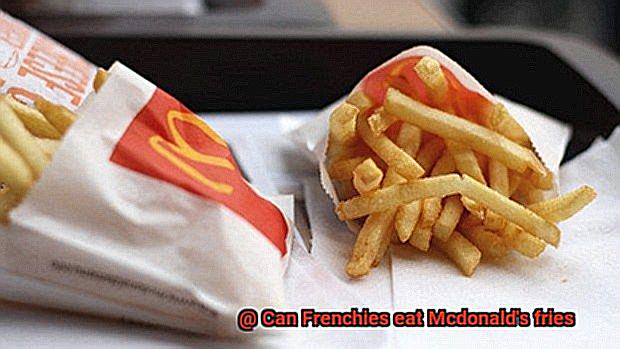
Allergies and Sensitivities:
French Bulldogs are known to have allergies or sensitivities to certain ingredients. McDonald’s fries contain artificial flavors, wheat, and other potentially allergenic ingredients that can trigger gastrointestinal upset or skin reactions in your Frenchie.
Digestive Issues:
The deep-fried nature of McDonald’s fries can be challenging for French Bulldogs to digest properly. This can lead to stomach issues such as bloating, gas, or even pancreatitis – a serious condition that requires immediate veterinary attention.
Healthier Alternatives:
Instead of feeding your Frenchie McDonald’s fries, consider these healthier alternatives:
Homemade Sweet Potato Fries:
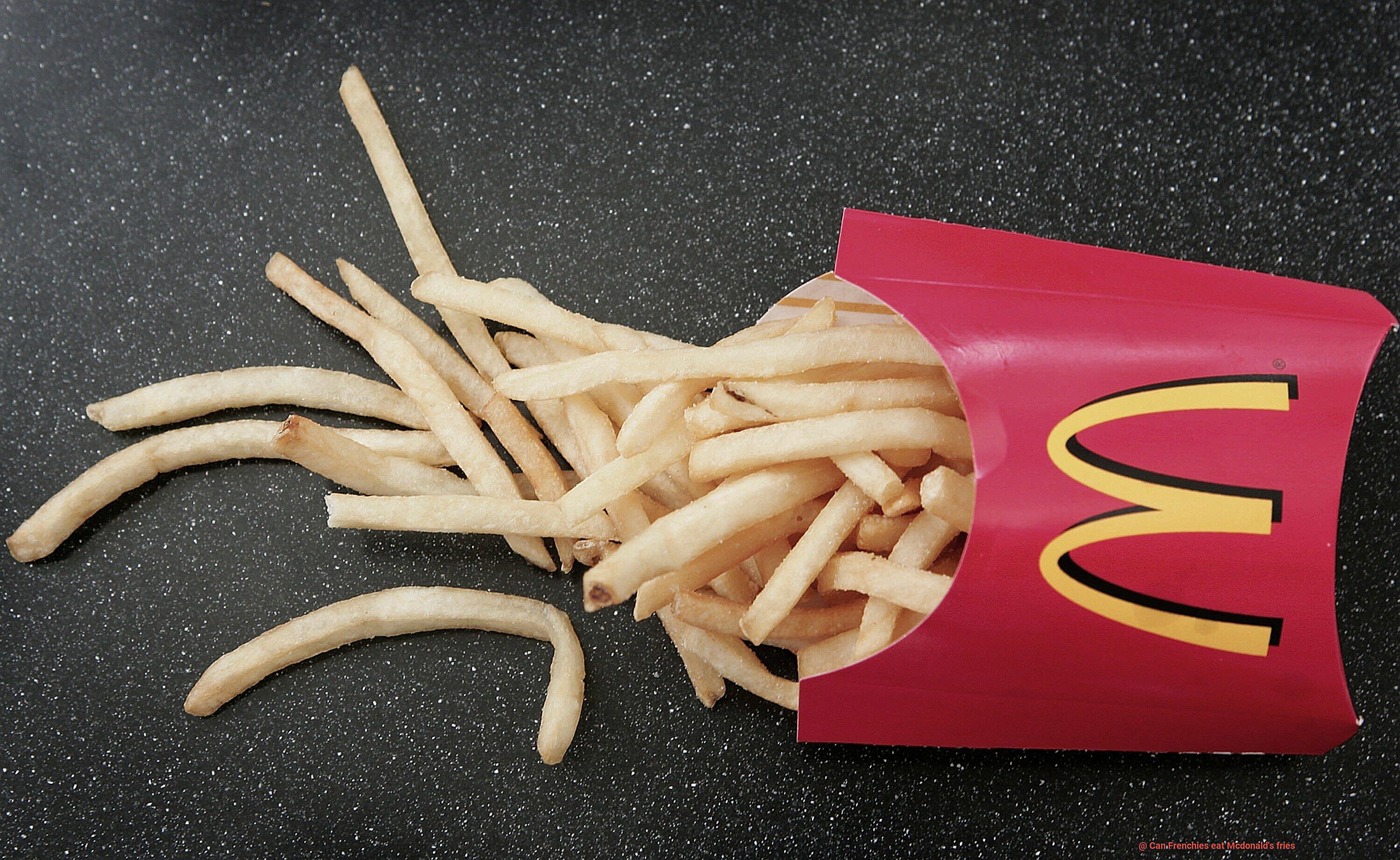
Slice sweet potatoes into thin strips, toss them in a little olive oil, and bake until crispy. Sweet potatoes are packed with nutrients and are easier for your Frenchie to digest than deep-fried fries.
Plain Boiled Potatoes:
Boiled potatoes are a safe and simple alternative. Cut them into bite-sized pieces and offer them as an occasional treat. Remember to avoid adding any seasonings or toppings that may be harmful to your Frenchie.
Consult Your Veterinarian:
Before introducing any new food into your Frenchie’s diet, including fast-food items like McDonald’s fries, it’s crucial to consult with your veterinarian. They can provide personalized guidance based on your dog’s specific needs and health condition.
Why Are McDonald’s Fries Unhealthy for French Bulldogs?
It can be tempting to share a few fries from your McDonald’s meal with your pup. But before you do, it’s important to understand why McDonald’s fries are unhealthy for French Bulldogs. In this article, we will delve into the reasons why these popular fast food fries are not suitable for your beloved four-legged companion.
High Fat and Sodium Content:
McDonald’s fries are notorious for their high fat content, which can be detrimental to your French Bulldog’s health. French Bulldogs are prone to obesity and weight gain, so consuming foods that are high in fat can exacerbate these issues. Additionally, the excessive sodium content in McDonald’s fries can lead to dehydration and kidney problems in French Bulldogs.
Unhealthy Cooking Method:
The cooking method used for McDonald’s fries is another reason why they are unhealthy for French Bulldogs. These fries are deep-fried in vegetable oil, which contains unhealthy trans fats. Trans fats have been linked to an increased risk of heart disease and other health problems in dogs. It’s best to avoid feeding your French Bulldog foods that are cooked in unhealthy fats.
Additives and Preservatives:
McDonald’s fries often contain additives and preservatives to enhance their taste and prolong their shelf life. These additives can be harmful to French Bulldogs, as they may cause digestive issues or allergic reactions. French Bulldogs have specific dietary needs, and feeding them human foods like McDonald’s fries can disrupt their nutritional balance.
The Importance of a Balanced Diet:
French Bulldogs require a well-balanced diet that is specially formulated for their breed. Feeding them fast food items like McDonald’s fries can lead to deficiencies or imbalances in their diet. It’s crucial to consult with your veterinarian to ensure you are providing your French Bulldog with the appropriate nutrition they need to thrive.
The Health Risks of Eating Too Much Fast-Food Fries
French Bulldogs, or “Frenchies” as they are affectionately known, are adorable and lovable companions. However, their love for food combined with their genetic predisposition to obesity makes it essential to be mindful of what they eat. In particular, fast-food fries can pose significant health risks for these furry friends. Let’s explore the potential dangers:
Weight Gain and Obesity:
Fast-food fries are notorious for their high fat and sodium content. Just like humans, Frenchies can easily pack on the pounds if they consume too much of these unhealthy treats. Extra weight can lead to a range of health problems for our four-legged friends, including joint issues, respiratory difficulties, and a decreased lifespan.
Heart Disease:
French Bulldogs are already prone to heart problems, such as congestive heart failure. The excessive consumption of fast-food fries, which are often cooked in unhealthy oils and contain trans fats, can further contribute to heart disease in both humans and dogs. It’s crucial to avoid feeding your Frenchie foods that can exacerbate these issues.
Kidney Problems:
Frenchies are more susceptible to kidney problems than other breeds, making the high salt content in fast-food fries particularly harmful. Excess sodium in their diet can put strain on the kidneys, leading to conditions like kidney disease or urinary tract infections. It’s important to prioritize their kidney health by avoiding foods with excessive salt.
Digestive Issues:
Fast-food fries cooked in unhealthy oils containing trans fats can also cause digestive issues in Frenchies. These adorable pups already have sensitive digestive systems, and consuming foods high in trans fats can lead to stomach upset, diarrhea, or vomiting. Protecting their delicate tummies is vital for their overall well-being.
To ensure the health and happiness of your Frenchie, it’s best to avoid feeding them fast-food fries altogether. Instead, opt for healthier alternatives like homemade sweet potato fries or baked vegetables. Always consult with your veterinarian for specific dietary recommendations tailored to your Frenchie’s needs.
What Are Some Healthy Alternatives to McDonald’s Fries?
French Bulldogs are known for their big personalities and love for food. However, their tendency to gain weight easily calls for a careful selection of treats. While McDonald’s fries may be tempting, they can lead to health issues for our furry friends. But worry not, I’ve got you covered with some healthy alternatives that will have your Frenchie saying “oui” to a delicious and nutritious snack.
Homemade Sweet Potato Fries:
Sweet potatoes are a fantastic alternative to regular fries. Packed with vitamins A and C, fiber, and antioxidants, they offer a healthier and more nutrient-dense option. Simply slice them into thin strips, toss them lightly in olive oil, and bake until golden brown and crispy. Your Frenchie will love the sweet taste and satisfying crunch.
Baked or Air-Fried Carrot Sticks:
Carrots are low in calories and high in fiber, making them a perfect choice for Frenchies watching their waistlines. They’re also loaded with beta-carotene, which promotes eye health and supports the immune system. Slice carrots into sticks, bake or air-fry them until they’re tender yet crunchy, and watch your Frenchie gobble them up with joy.
Zucchini Fries:
Zucchinis are another fantastic alternative to McDonald’s fries. With their low calorie content and high water content, they’re hydrating and nutritious for your Frenchie. Rich in vitamins A and C, potassium, and antioxidants, zucchini fries can be made by slicing the vegetable into strips, lightly coating them in olive oil, and baking until crispy. Your Frenchie won’t be able to resist this healthy and delicious treat.
Green Bean Fries:
Green beans aren’t just a human favorite; they make a fantastic snack for Frenchies too. Low in calories and high in fiber, green beans aid digestion and weight management. They’re also packed with vitamins A, C, and K, folate, and potassium. Simply roast trimmed green beans with a dash of olive oil until they’re crispy and irresistible. Your Frenchie will thank you for this crunchy and nutritious snack.
Tips for Introducing New Foods to Your Frenchie’s Diet
If you have a French Bulldog, you know how important it is to provide them with a healthy and balanced diet. However, introducing new foods to their diet can be a delicate process. Frenchies have sensitive stomachs, and sudden changes in their diet can lead to digestive upset and discomfort. In this article, we will discuss the importance of gradually introducing new foods to your Frenchie’s diet and the potential risks associated with sudden changes. We will also provide some helpful tips to make the transition smoother for your furry friend.
Start with Small Portions:
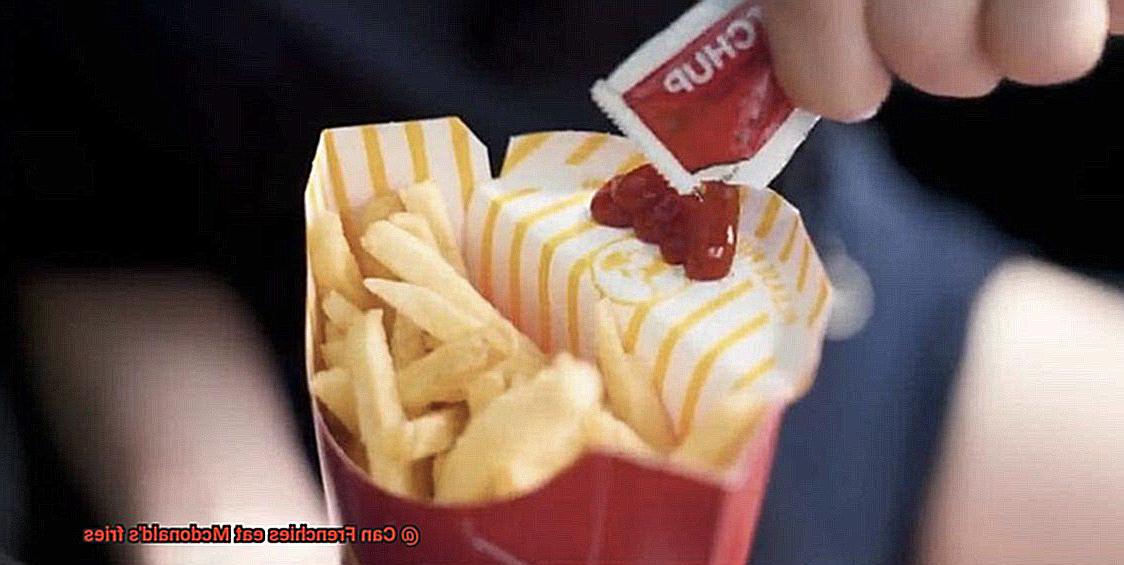
When introducing a new food to your Frenchie’s diet, it’s best to start with small portions. This allows their digestive system to adjust slowly and reduces the risk of any adverse reactions. Begin by mixing just a few pieces or a teaspoon of the new food with their regular diet. Monitor your Frenchie closely for any signs of allergies or digestive issues, such as itching, redness, swelling, vomiting, or diarrhea. If you notice any of these symptoms, discontinue the new food immediately and consult with your veterinarian.
One Food at a Time:
It’s important to introduce one new food at a time to your Frenchie’s diet. This helps you identify any specific foods that may not agree with their digestive system. If you introduce multiple new foods at once and your Frenchie has a negative reaction, it will be difficult to pinpoint which food is causing the issue. By introducing one food at a time, you can carefully observe your Frenchie’s response and make adjustments accordingly.
Gradual Transition:
To avoid overwhelming your Frenchie’s digestive system, gradually increase the amount of the new food over time while reducing the amount of their regular diet. A gradual transition helps their taste buds adapt to the new flavors and textures. It’s important to be patient during this process, as some dogs may take longer to accept and enjoy new foods than others. Don’t force your Frenchie to eat something they don’t like; instead, try different flavors and textures until you find something that suits their taste preferences.
Choose High-Quality Foods:
When introducing new foods to your Frenchie’s diet, it’s essential to choose high-quality, nutritious options. Avoid feeding them foods that are high in sodium, artificial preservatives, or unhealthy oils. Instead, opt for natural, whole foods that are free from additives and fillers. Consult with your veterinarian or a canine nutritionist to ensure you are providing a balanced and appropriate diet for your Frenchie.
How to Determine If Your Dog Is Allergic to Fast-Food Fries
French Bulldogs, known for their adorable squishy faces and playful personalities, are beloved companions. However, their sensitive stomachs and susceptibility to allergies require extra caution when it comes to their diet. In this guide, we’ll explore the signs of food allergies in dogs and provide insights on determining if your Frenchie is allergic to fast-food fries.
Signs of Food Allergies in Dogs:
Food allergies can manifest in various ways, including itching, redness or inflammation of the skin, gastrointestinal issues like vomiting or diarrhea, sneezing, coughing, and even behavioral changes. It is crucial to be vigilant about these symptoms to ensure your furry friend’s well-being.
The Role of Fast-Food Fries in Allergies:
Fast-food fries may contain ingredients that can trigger allergic reactions in dogs. Common culprits include excessive salt, artificial flavors, preservatives, and potentially harmful cooking oils. These additives can cause adverse reactions in Frenchies with sensitive digestive systems.
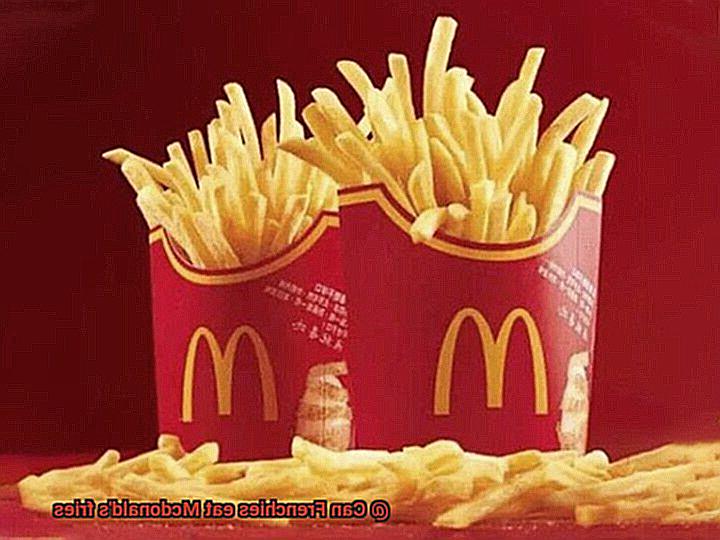
Consultation with a Veterinarian:
If you suspect your Frenchie is allergic to fast-food fries or any other food, it is essential to consult with a veterinarian. They can perform tests to determine specific allergens and guide you on managing your dog’s diet effectively. A professional diagnosis is crucial for accurate identification and appropriate treatment.
Elimination Diet:
An elimination diet involves removing potential allergens from your dog’s diet and reintroducing them one by one to identify the culprit. This process requires strict adherence and meticulous record-keeping of any reactions or changes observed during each phase.
Keeping Track of Symptoms:
To accurately identify if fast-food fries are causing an allergic reaction, closely monitor your Frenchie’s behavior and physical condition after consumption. Maintain a food diary or use a mobile app to note any symptoms or changes observed. This record will be helpful during consultations with your veterinarian.
Seeking Professional Advice:
Self-diagnosing or assuming your dog’s allergies can be risky. It is crucial to seek professional advice from a veterinarian experienced in canine allergies. They can provide accurate diagnosis and guidance tailored to your Frenchie’s specific needs.
Alternatives to Fast-Food Fries:
Instead of fast-food fries, consider healthier alternatives that your Frenchie can enjoy. Homemade sweet potato fries, baked carrot sticks, or other dog-friendly vegetables are safe and nutritious options that will satisfy their cravings without any potential allergic reactions.
What Happens If My Frenchie Eats McDonald’s Fries?
French Bulldogs, with their adorable squished faces and playful personalities, are beloved pets for many. However, these lovable canines have sensitive stomachs and are prone to digestive issues. So, what happens if your Frenchie gets their paws on some McDonald’s fries? Let’s dig in and find out.
- Gastrointestinal Upset: The high salt, fat, and preservatives in McDonald’s fries can wreak havoc on your Frenchie’s tummy. Symptoms like vomiting and diarrhea may appear shortly after ingestion or even several hours later. It’s not a pretty sight, trust me.
- Dehydration Dilemma: French Bulldogs already struggle with regulating their body temperature due to their brachycephalic (short-nosed) anatomy. Add the high salt content of the fries into the mix, and you have a recipe for dehydration. Keep those water bowls filled.
- Pancreatitis Possibility: Pancreatitis is no joke. This inflammation of the pancreas can be triggered by consuming foods high in fat, and McDonald’s fries definitely fit the bill. So, if your Frenchie starts showing signs of abdominal pain, loss of appetite, or vomiting after indulging in these greasy treats, it’s time to call the vet.
- Chemical Conundrum: Fast-food fries are loaded with additives and preservatives that can spell trouble for our furry friends. Allergic reactions and other adverse effects on their health could be lurking around the corner. Say no to chemicals.
- Long-Term Health Hazards: Even if your Frenchie doesn’t immediately show signs of illness after eating McDonald’s fries, it doesn’t mean they’re in the clear. Regular consumption of these unhealthy foods can lead to obesity, diabetes, and other chronic health conditions in the long run. Let’s keep our Frenchies fit and fabulous.
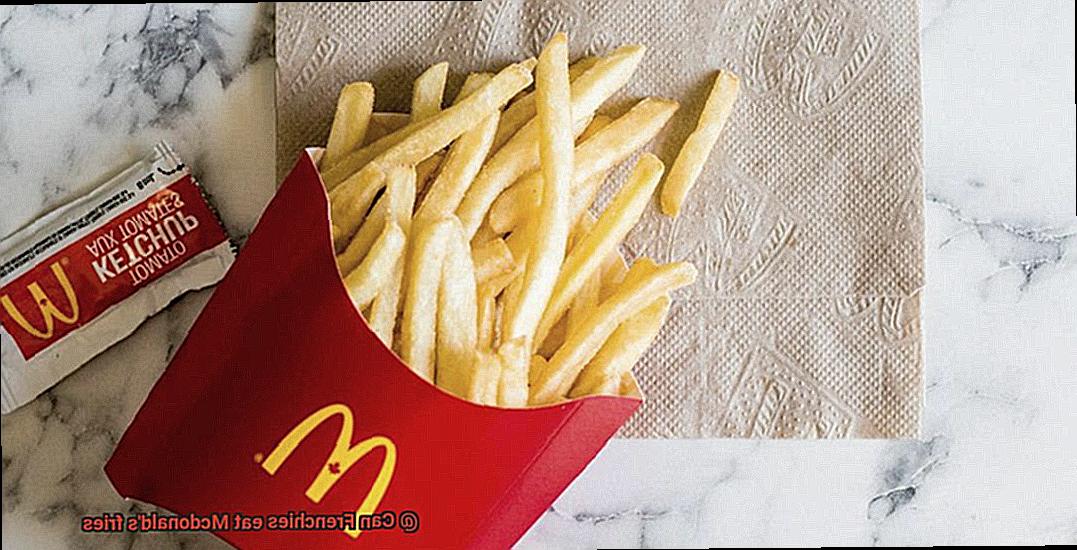
Making Sure Your Dog Gets the Proper Nutrition from Their Food
French Bulldogs, those adorable squish-faced companions, may steal your heart, but their sensitive stomachs make them prone to digestive issues. So, it’s crucial to provide them with a balanced and nutritious diet to maintain their overall health and well-being. Here are some tips to ensure your Frenchie gets the proper nutrition from their food:
Choose the Right Food:
- Look for dog food that is specifically formulated for French Bulldogs or small breeds. Their nutritional needs may differ from larger breeds.
- Opt for dog food that contains high-quality sources of protein, such as chicken or beef. Protein is essential for building strong bones and muscles.
- Ensure the food contains essential vitamins and minerals to support a healthy immune system.
- Avoid dog food that contains fillers, artificial flavors, and preservatives. These additives can be detrimental to your Frenchie’s health.
Consult with Your Veterinarian:
- It’s always a good idea to consult with your veterinarian to determine the appropriate portion sizes and feeding schedule for your Frenchie.
- Your vet will consider factors like your Frenchie’s age, weight, and activity level when recommending a feeding plan.
Healthy Treats in Moderation:
- In addition to their regular diet, provide your Frenchie with a variety of healthy treats made specifically for dogs.
- Make sure to choose treats that are low in calories and contain natural ingredients.
- Treats should be given in moderation and should not exceed 10% of their daily caloric intake.
Fresh Water Always Available:
It is crucial to ensure that your Frenchie has access to fresh water at all times. Hydration is essential for their overall health.
While these tips can help you provide your Frenchie with the proper nutrition, it’s important to note that every dog is unique. Some Frenchies may have specific dietary requirements or food allergies, so it’s always a good idea to consult with your veterinarian for personalized advice.
Remember, providing your Frenchie with a nutritious diet is key to their overall health and happiness. So let’s keep our Frenchies fit and fabulous by giving them the proper nutrition they deserve.
Conclusion
In conclusion, it is safe for Frenchies to enjoy McDonald’s fries in moderation.
These little pups can indulge in the crispy, golden goodness of these iconic fast-food treats without any major health concerns. However, it’s important to remember that a balanced and nutritious diet should always be a top priority for our furry friends.
With proper portion control and mindful feeding practices, Frenchies can savor the deliciousness of McDonald’s fries without compromising their well-being.
